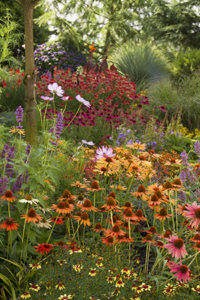My garden helps me in a lot of ways. Being among my plants helps me feel less stressed and more relaxed. I also take heart in the fact that my garden is good for me and good for the planet. Here are six ways beautiful landscapes make the world a better place.
1. Gardens Provide for Pollinators
Pollinators and other wildlife find food and refuge in our landscapes. Trees and shrubs provide nesting sites for birds, squirrels, and other creatures. Flowers supply nectar for hungry bees, butterflies, and hummingbirds. You may find your annuals and perennials attract beneficial insects. Ladybugs, for instance, attack other insect pests. Host plants, like Milkweeds, offer foliage for hungry caterpillars to feed on before they become butterflies and moths.
Even a collection of container plantings on your deck, patio, or balcony can support wildlife in your area.
2. Plants Cleanse the Air
Through their breathing process, plants naturally filter the air and produce oxygen. Our gardens are like a miniature version of an Amazon rain forest. Our trees and shrubs, in particular, sequester carbon as they grow. This decreases your carbon footprint. The more plants you have in your landscape, the more you are contributing to the planet.

3. Plants Clean the Soil and Water
Our plants’ biological processes improve the environment beyond the air. Many common garden plants have been scientifically shown to remove pollutants from the soil. Your plants (like SunBelievable® Brown Eyed Girl Helianthus) may be removing contaminants in the soil you didn't know were there.
Our landscapes also help with water quality. When it rains, a great deal of water can rush off your roof. In cities, if water from the roof goes onto a paved area, like driveways, it heads straight into storm sewers. When runoff goes into a planted area, the moisture is filtered through plant roots. Then the soil, slowing water loss, allows plants to clean it.
4. Plants Reduce Light and Noise Pollution
Well-placed plants in our landscape improve the environment by reducing light pollution. This is especially true in urban areas. Brightening the sky at night can affect the natural cycles of plants and animals, especially migratory birds.
Trees, shrubs, ornamental grasses, and other plants filter sound, especially in urban environments. Evergreens with dense foliage are among the best landscape plants for reducing street noise and other sounds.
5. Plants Can Reduce Home Energy Use
Smart landscaping may lower the use of your furnace or air conditioner. This further reduces your carbon footprint and helps you save money at the same time. In cold climates, an evergreen windbreak on your home’s north or east side prevents winter heat loss. Some studies suggest the right windbreak can cut your furnace use by 30 percent or more.
In hot-summer climates, plant a tree to shade your home in the afternoon hours. It will naturally keep your house cooler without as much air conditioning.
Lead photo: Credit Getty/SV Production
